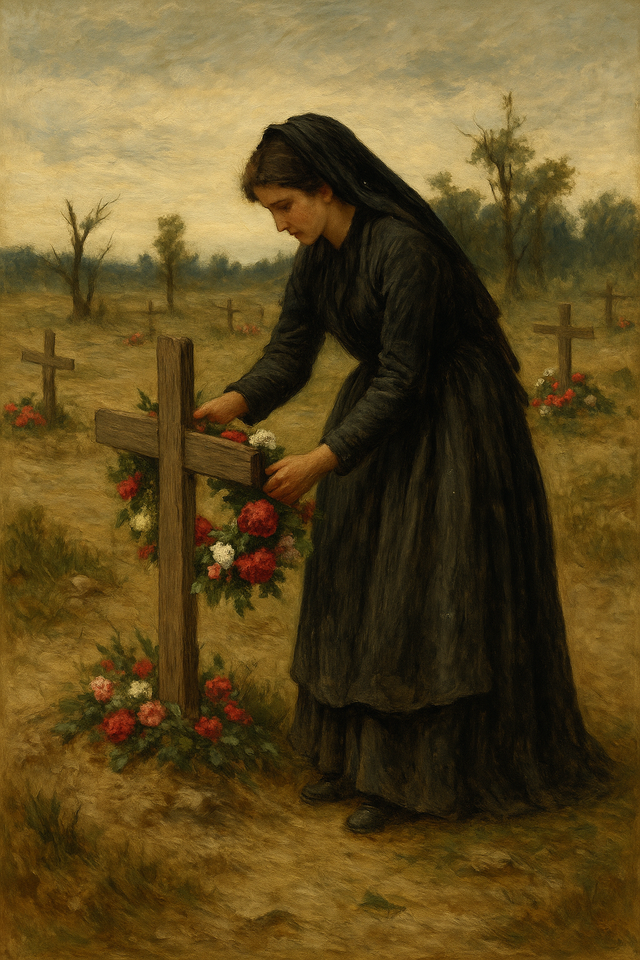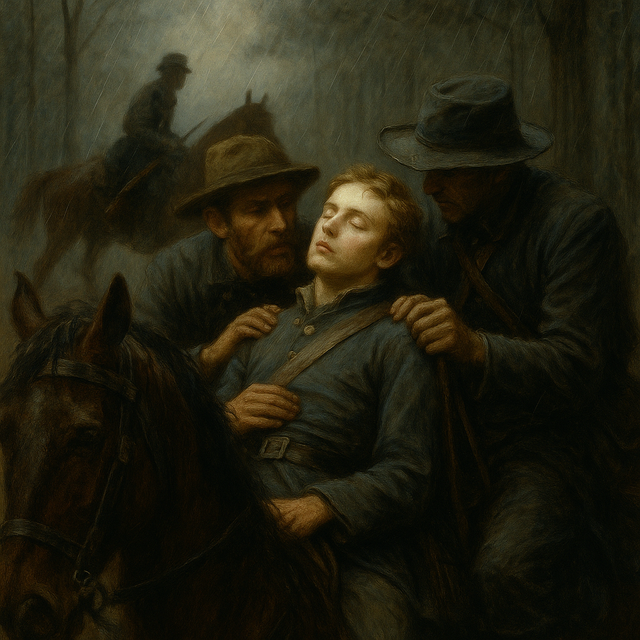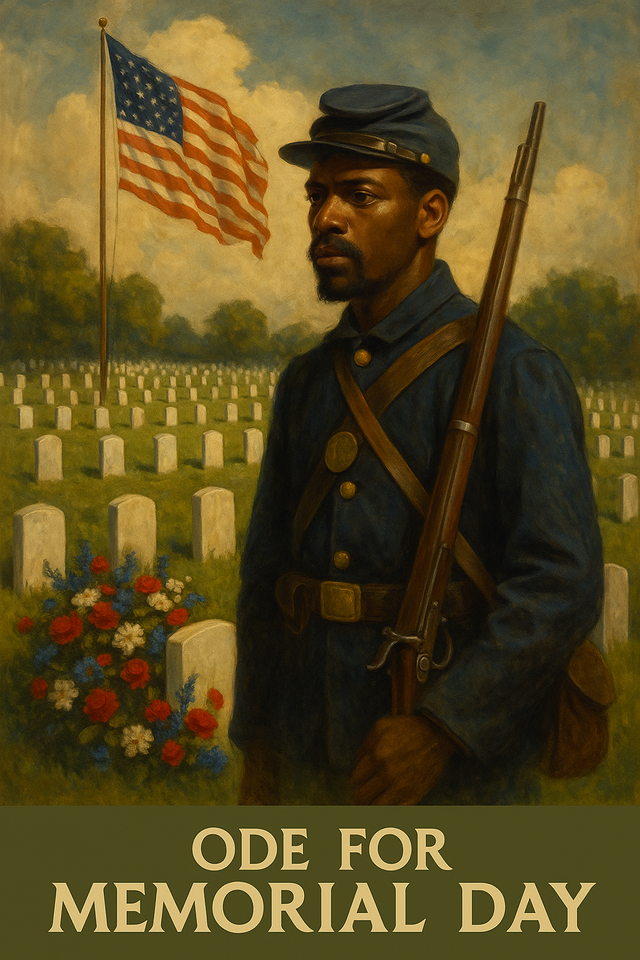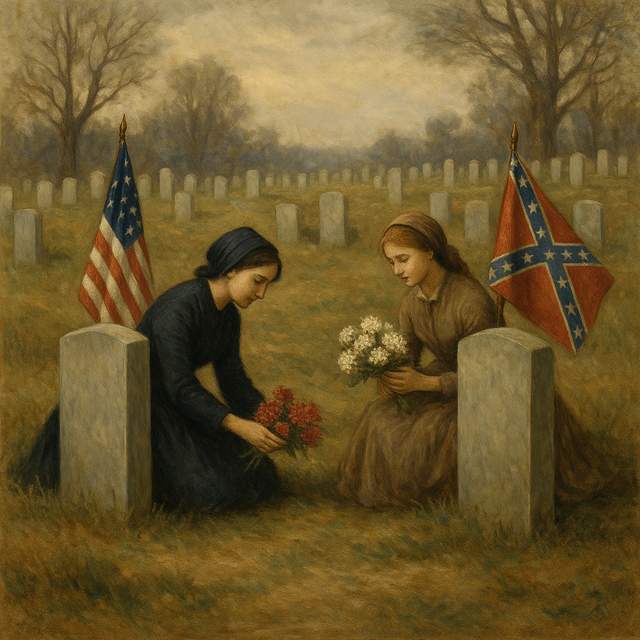“Graves Without Bitterness: A Memorial Day Poetry Collection”
The Blue and the Gray
By Francis Miles Finch (1867)
By the flow of the inland river,
Whence the fleets of iron have fled,
Where the blades of the grave-grass quiver,
Asleep are the ranks of the dead—
Under the sod and the dew,
Waiting the judgment-day—
Under the one, the Blue;
Under the other, the Gray.
These in the robings of glory,
Those in the gloom of defeat,
All with the battle-blood gory,
In the dusk of eternity meet:
Under the sod and the dew,
Waiting the judgment-day—
Under the laurel, the Blue;
Under the willow, the Gray.
From the silence of sorrowful hours
The desolate mourners go,
Lovingly laden with flowers
Alike for the friend and the foe;
Under the sod and the dew,
Waiting the judgment-day—
Love and tears for the Blue;
Tears and love for the Gray.
So, with an equal splendor,
The morning sun-rays fall,
With a touch impartially tender,
On the blossoms blooming for all:
Under the sod and the dew,
Waiting the judgment-day—
Broidered with gold, the Blue;
Mellowed with gold, the Gray.
So, when the summer calleth,
On forest and field of grain
With an equal murmur falleth
The cooling drip of the rain:
Under the sod and the dew,
Waiting the judgment-day—
Wet with the rain, the Blue;
Wet with the rain, the Gray.
Sadly, but not with upbraiding,
The generous deed was done;
In the storm of the years that are fading,
No braver battle was won:
Under the sod and the dew,
Waiting the judgment-day—
Under the blossoms, the Blue;
Under the garlands, the Gray.
No more shall the war-cry sever,
Or the winding rivers be red;
They banish our anger forever
When they laurel the graves of our dead!
Under the sod and the dew,
Waiting the judgment-day—
Love and tears for the Blue;
Tears and love for the Gray.
The Women of the South
By Howard Glyndon (Laura C. Redden Searing)
They have no bitter words to say,
But only tears and flowers today;
They strew the graves of those who fell
Alike for those who fought so well.
No thought of triumph, no disdain,
No pride of conquest, no disdain;
But tender hands and hearts that feel
The wounds that time can never heal.
They see no flags, they hear no drums,
No martial music hither comes;
But only silence, deep and still,
That speaks of sorrow's utmost thrill.
Oh, noble hearts! Oh, women true!
Who gave your best, your bravest too;
And now with gentle hands and brave,
You deck the unknown soldier's grave.
No matter if he wore the blue,
Or gray, your tears are for the true;
And in your hearts no hatred dwells,
But only love that sorrow tells.
So let the world take heed and learn,
From you, who to the past can turn,
And find amid its darkest hours,
The grace to strew with love the flowers.

Killed at the Ford
By Henry Wadsworth Longfellow
He is dead, the beautiful youth,
The heart of honor, the tongue of truth,
He, the life and light of us all,
Whose voice was blithe as a bugle call,
Whom all eyes followed with one consent,
The cheer of whose laugh, and whose pleasant word,
Hushed all murmurs of discontent.
Only last night, as we rode along,
Down the dark of the mountain gap,
To visit the picket-guard at the ford,
Little dreaming of any mishap,
He was humming the words of some old song:
"Two red roses he had on his cap,
And another he bore at the point of his sword."
Sudden and swift a whistling ball
Came out of a wood, and the voice was still;
Something I heard in the darkness fall,
And for a moment my blood grew chill;
I spoke in a whisper, as he who speaks
In a room where some one is lying dead;
But he made no answer to what I said.
We lifted him up to his saddle again,
And through the mire and the mist and the rain
Carried him back to the silent camp,
And laid him down on his bed of pain.
His lips with the dying murmur moved
As if to answer the prayer we said,
And he faintly smiled as he bowed his head.
He is dead, the beautiful youth,
The heart of honor, the tongue of truth;
He, the life and light of us all,
Whose voice was blithe as a bugle call,
Whom all eyes followed with one consent,
The cheer of whose laugh, and whose pleasant word,
Hushed all murmurs of discontent.

Ode for Memorial Day
By Paul Laurence Dunbar
Done are the toils and the wearisome marches,
Done is the summons of bugle and drum.
Softly and sweetly the sky overarches,
Shelt’ring a land where Rebellion is dumb.
Dark were the days of the country’s derangement,
Sad were the hours when the conflict was on,
But through the gloom of fraternal estrangement
God sent his light, and we welcome the dawn.
O’er the expanse of our mighty dominions,
Sweeping away to the uttermost parts,
Peace, the wide-flying, on untiring pinions,
Bringeth her message of joy to our hearts.
Ah, but this joy which our minds cannot measure,
What did it cost for our fathers to gain!
Bought at the price of the heart’s dearest treasure,
Born out of travail and sorrow and pain;
Born in the battle where fleet Death was flying,
Slaying with sabre-stroke bloody and fell;
Born where the heroes and martyrs were dying,
Torn by the fury of bullet and shell.
Ah, but the day is past: silent the rattle,
And the confusion that followed the fight.
Peace to the heroes who died in the battle,
Martyrs to truth and the crowning of Right!
Out of the blood of a conflict fraternal,
Out of the dust and the dimness of death,
Burst into blossoms of glory eternal
Flowers that sweeten the world with their breath.
Flowers of charity, peace, and devotion
Bloom in the hearts that are empty of strife;
Love that is boundless and broad as the ocean
Leaps into beauty and fullness of life.
So, with the singing of paeans and chorals,
And with the flag flashing high in the sun,
Place on the graves of our heroes the laurels
Which their unfaltering valor has won!

